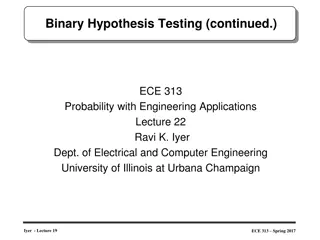
Semantic Analysis in C++ Programming: Assignments and Actions in Bison Parser
This content discusses assignments related to semantic analysis in C++ programming, covering topics from declarations to expressions, statements, conversions, and more. It also delves into semantic actions in Bison parser, explaining how purely-synthesized attribute grammars work and the support provided by Bison in building bottom-up trees during reductions.
Download Presentation

Please find below an Image/Link to download the presentation.
The content on the website is provided AS IS for your information and personal use only. It may not be sold, licensed, or shared on other websites without obtaining consent from the author. If you encounter any issues during the download, it is possible that the publisher has removed the file from their server.
You are allowed to download the files provided on this website for personal or commercial use, subject to the condition that they are used lawfully. All files are the property of their respective owners.
The content on the website is provided AS IS for your information and personal use only. It may not be sold, licensed, or shared on other websites without obtaining consent from the author.
E N D
Presentation Transcript
Cecko Assignment 3 to 5 Semantic analysis NPRG041 Programov n v C++ - 2019/2020 David Bedn rek 1
Base and bonus assignments Assignment 3 declarations Assignment 4 Assignment 5 100: Types: Built-in, TYPEIDF, const Pointer, Function Declarations: Variable, Function Expressions: Integer literals Statements: Return 100: Conversions: Array-to-pointer _Bool/char-to-int, int-to-char Expressions: char/string literals, Variables Function call (also variadic) Unary +, -, *, & Binary int +,-,*,/,% Binary char/int/ptr = Statements: expression, return 100: Conversions: any-to-_Bool Expressions: int <,<=,>,>=,==,!= Unary ! _Bool = _Bool arguments and return values Statements: if,while,do +10: Declarations: typedef +10: sizeof +10: Statements: for +10: Types: Array +10: Expressions: int ++, --, +=, -=, *=, /=, %= ptr ++, --, +=, -= +10: Expressions: ptr <,<=,>,>=,==,!= ptr-ptr +20: Types: Enum +20: Expressions: ptr+int, int+ptr, ptr-int ptr[int], int[ptr] +30: Expressions: Binary ||,&& +20: Types: Struct +10: Expressions: .,->, struct = Struct arguments and return values +6: Bonus for passing extra tests
bison a bison parser can evaluate a purely-synthesized attribute grammar synthesized attributes are passed from children to parents i.e. from the right-hand-side of a rule to the nonterminal on the left inherited attributes cannot be supported by bison LALR(1) parser builds the tree bottom-up, during reductions bison supports only one attribute for each non-terminal it may be a C++ structure each non-terminal may produce a different type of attribute attribute types are declared in the first section of a grammar file declaration of the terminal A and its attribute type T %token<T> A declaration of the attribute type T of the non-terminal a %type<T> a attribute values are assigned in the C++ code for each rule example: evaluating an expression (in compile time) %type<double> mul_expr add_expr %% add_expr: mul_expr { $$ = $1; } | add_expr ADD mul_expr { $$ = $1 + $3; } | add_expr SUB mul_expr { $$ = $1 - $3; } ;
bison Technical details %token<T> A %type<T> a The T must be a class/type (qualified) identifier in C++ container instances, pointers, etc. must be named by typedef/using The T must support default constructor and copy-assignment data containing unique_ptr cannot be used In the case of syntax-error recovery, attributes are discarded instead of being used in a rule $$ denotes the attribute of the LHS non-terminal the output attribute of the rule it shall be assigned by the C++ code of the rule it may be assigned by parts ($$.a) or accessed repeatedly in the code fragment $i denotes the attribute of the i-th symbol on the RHS every symbol counts, even if it has no attribute @i denotes the location (line number) of the i-th symbol on the RHS for non-terminals, it is automatically computed from terminals contained if there is no C++ code in a rule, { $$ = $1; } is used automatically it may fail due to type incompatibility not a good practice to rely on this
bison a bison parser can evaluate a purely-synthesized attribute grammar it is sufficient for compiling expressions and declarations it cannot pass the information from the declaration to a use of an identifier instead of bison attributes, global state (ctx) must be used we must understand the order in which the C++ code fragments are executed a post-order pass through the (physically non-existent) derivation tree special care needed in some cases example: linked list declaration struct N { int v; struct N * next; }; the declaration of struct N must appear in symbol tables before entering the { } the full definition of struct N must be added to symbol tables afterwards decl_head: STRUCT IDF { $$ = ctx->struct_definition_open($2); } decl: decl_head LCUR elem_list RCUR { ctx->struct_definition_close($1,$3); } ; note: bison can somehow handle code fragments inside the RHS their presence has surprising side-effects rewriting grammar to keep code at the end of RHS is preferred in Assignments 4 and 5, we will need similar tricks to handle code generation
bison & flex bison is a LALR(1) parser look-ahead of 1 token when parser does a reduce, lexer has already processed the next token the TYPEIDF trick in the lexer [a-z]+ { if ( ctx->is_typedef(yytext) ) return make_TYPEIDF( yytext); else return make_IDF( yytext); } Example: typedef int * ptr ; ptr x ; In the parser, this rule... declaration: TYPEDEF type declarator SEMIC { ctx->define_typedef($2, $3); }; ... would NOT work the second "ptr" is already returned from the lexer as IDF when define_typedef is called The correct solution is: declaration_core: TYPEDEF type declarator { ctx->define_typedef($2, $3); }; declaration: declaration_core SEMIC; The real grammar allows a sequence of declarators it may be rewritten as: declaration_core: TYPEDEF type declarator { ctx->define_typedef($2, $3); $$ = $2; } | declaration_core COMMA declarator { ctx->define_typedef($1, $2); $$ = $1; } ; in reality, it must allow more variants than "TYPEDEF type" including "int typedef const" Another example scope exit must be reported before the closing parenthesis void f(); int x; void g() { { typedef char f; } f(x); }
A minimal introduction to LLVM IR
LLVM IR LLVM Intermediate Representation The output of your work (directly or indirectly through the cecko framework) Global variables (including string constants) Functions containing code (including instructions allocating local variables) llvm::Value Abstract class representing any "algorithm" providing a value Held by llvm::Value * = cecko::CKIRValueObs llvm::Constant llvm::ConstantInt integer constants computed during compilation Held by llvm::ConstantInt * = cecko::CKIRConstantIntObs other immutable values like addresses of global variables llvm::Instruction anything computed at run-time including llvm::AllocaInst - allocate an address for a local variable Automatically generated by the cecko framework created using llvm::IRBuilder - provides automatic constant folding if an instruction being created has constant operands, the result constant is created instead llvm::Type Abstract class representing a type of a value Held by llvm::Type * = cecko::CKIRTypeObs Simplified type system of the C language arbitrarily sized integers, floats, pointer, arrays, structs, functions no enums, no signed/unsigned flag, no const flag insufficient for compiling C
The cecko framework for Assignment 3
cecko framework The cecko framework provides A type system corresponding to the cecko language void, _Bool, char, int the built-in types pointer, array, function struct, enum const flags where required Named entities in two name spaces Identifiers. Due to the TYPEIDF trick, divided into two subspaces Named objects enum constants, variables, functions IDF tokens Typedefs defined from IDF tokens, used as TYPEIDF tokens Tags structs and enums You shall allow both IDF and TYPEIDF after struct/enum keywords! Both name spaces are divided into scopes (i.e. compound statements) The framework automatically handles scoping rules Your responsibility is to report scope boundaries Scopes also provide automatic distinction between global and local variables Function arguments are automatically converted into local variables structs, enums and functions have distinct declarations and definitions Where applicable, the framework also creates the corresponding LLVM entities
cecko framework All creation/modification services of the framework provided through ctx hold by cecko::context_obs member functions of cecko::CKContext member functions of cecko::context (messaging functions) Inspecting entity properties is done via the corresponding (abstract) class cecko::CKAbstractType all type descriptors hold by cecko::CKTypeObs cecko::CKAbstractNamed constants, variables, functions hold by cecko::CKNamedObs cecko::CKTypedef typedefs hold by cecko::CKTypedefConstObs For many entities, there are two types of pointers, e.g.: cecko::CKTypeObs = const cecko::CIAbstractType * Dereference (->) will crash when null cecko::CKTypeSafeObs Dereference (->) is safe (provides a dummy object) when null Use ! to test for null This allows easy recovery from many semantic errors Implicitly convertible to cecko::CKTypeObs
Examples typedef const int * strange[3]; int auto t1=ctx->get_int_type(); const auto tp1=CKTypeRefSafePack(t1,true); 3 auto value=ctx->get_int32_constant(3); * auto t2=ctx->get_pointer_type(tp1); auto tp2=CKTypeRefSafePack(t2,false); [] auto t3=ctx->get_array_type(tp2.type,value); auto tp3=CKTypeRefSafePack(t3,tp3.is_const); strange ctx->define_typedef( strange ,tp3,loc);






















